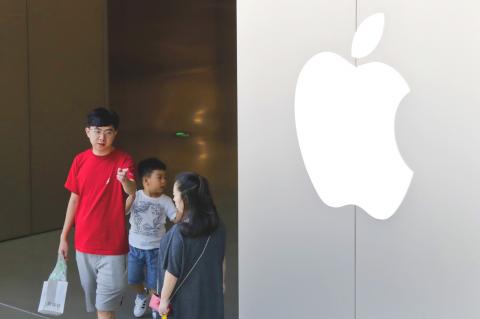Apple Inc yesterday said it is removing virtual private network (VPN) services from its app store in China, drawing criticism from VPN service providers, who accuse the US tech giant of bowing to pressure from Beijing cyber regulators.
VPNs allow users to bypass China’s restrictions on access to overseas sites.
In January, Beijing passed laws seeking to ban all VPNs that are not approved by state regulators. Approved VPNs must use state network infrastructure.

Photo: AP
An Apple spokeswoman yesterday confirmed it is to remove apps that do not comply with the law from its China App Store, including services based outside the country.
Beijing has shut down dozens of China-based providers and it has been targeting overseas services as it bids to tighten its control over the Internet, especially ahead of the 19th National Congress of the Chinese Communist Party in August.
While personal VPN providers have been the subject of state-led attacks in the past, this marks the first time Apple has complied with requests to scrub overseas providers from its store, a move that VPN providers said is unnecessarily supportive of China’s heightened censorship regime.
VPN provider ExpressVPN on Saturday said that it had received notice from Apple that its software would be removed from the China App Store “because it includes content that is illegal in China.”
“We’re disappointed in this development, as it represents the most drastic measure the Chinese government has taken to block the use of VPNs to date and we are troubled to see Apple aiding China’s censorship efforts,” ExpressVPN said in a statement.
Other major providers, including VyprVPN and StarVPN, confirmed they also received the notice from Apple on Saturday.
“We view access to Internet in China as a human rights issue and I would expect Apple to value human rights over profit,” Sunday Yokubaitis, president of Golden Frog, which oversees VyprVPN, told reporters yesterday.
Yokubaitis said Golden Frog will file an appeal to Apple over the ban.
Chinese users with billing addresses in other countries will still be able to access VPN apps from other branches of the App Store. A number of VPN apps were still accessible on the China App Store on Saturday.
VPN providers said that while the apps are not available on the store, users could still manually install them using VPN support built into Apple’s operating system.
“We are extremely disappointed that Apple has bowed to pressure,” Yokubaitis said. “[It’s been a] disappointing morning, but we will fight on.”

CAUTIOUS RECOVERY: While the manufacturing sector returned to growth amid the US-China trade truce, firms remain wary as uncertainty clouds the outlook, the CIER said The local manufacturing sector returned to expansion last month, as the official purchasing managers’ index (PMI) rose 2.1 points to 51.0, driven by a temporary easing in US-China trade tensions, the Chung-Hua Institution for Economic Research (CIER, 中華經濟研究院) said yesterday. The PMI gauges the health of the manufacturing industry, with readings above 50 indicating expansion and those below 50 signaling contraction. “Firms are not as pessimistic as they were in April, but they remain far from optimistic,” CIER president Lien Hsien-ming (連賢明) said at a news conference. The full impact of US tariff decisions is unlikely to become clear until later this month

GROWING CONCERN: Some senior Trump administration officials opposed the UAE expansion over fears that another TSMC project could jeopardize its US investment Taiwan Semiconductor Manufacturing Co (TSMC, 台積電) is evaluating building an advanced production facility in the United Arab Emirates (UAE) and has discussed the possibility with officials in US President Donald Trump’s administration, people familiar with the matter said, in a potentially major bet on the Middle East that would only come to fruition with Washington’s approval. The company has had multiple meetings in the past few months with US Special Envoy to the Middle East Steve Witkoff and officials from MGX, an influential investment vehicle overseen by the UAE president’s brother, the people said. The conversations are a continuation of talks that

CHIP DUTIES: TSMC said it voiced its concerns to Washington about tariffs, telling the US commerce department that it wants ‘fair treatment’ to protect its competitiveness Taiwan Semiconductor Manufacturing Co (TSMC, 台積電) yesterday reiterated robust business prospects for this year as strong artificial intelligence (AI) chip demand from Nvidia Corp and other customers would absorb the impacts of US tariffs. “The impact of tariffs would be indirect, as the custom tax is the importers’ responsibility, not the exporters,” TSMC chairman and chief executive officer C.C. Wei (魏哲家) said at the chipmaker’s annual shareholders’ meeting in Hsinchu City. TSMC’s business could be affected if people become reluctant to buy electronics due to inflated prices, Wei said. In addition, the chipmaker has voiced its concern to the US Department of Commerce

STILL LOADED: Last year’s richest person, Quanta Computer Inc chairman Barry Lam, dropped to second place despite an 8 percent increase in his wealth to US$12.6 billion Staff writer, with CNA Daniel Tsai (蔡明忠) and Richard Tsai (蔡明興), the brothers who run Fubon Group (富邦集團), topped the Forbes list of Taiwan’s 50 richest people this year, released on Wednesday in New York. The magazine said that a stronger New Taiwan dollar pushed the combined wealth of Taiwan’s 50 richest people up 13 percent, from US$174 billion to US$197 billion, with 36 of the people on the list seeing their wealth increase. That came as Taiwan’s economy grew 4.6 percent last year, its fastest pace in three years, driven by the strong performance of the semiconductor industry, the magazine said. The Tsai